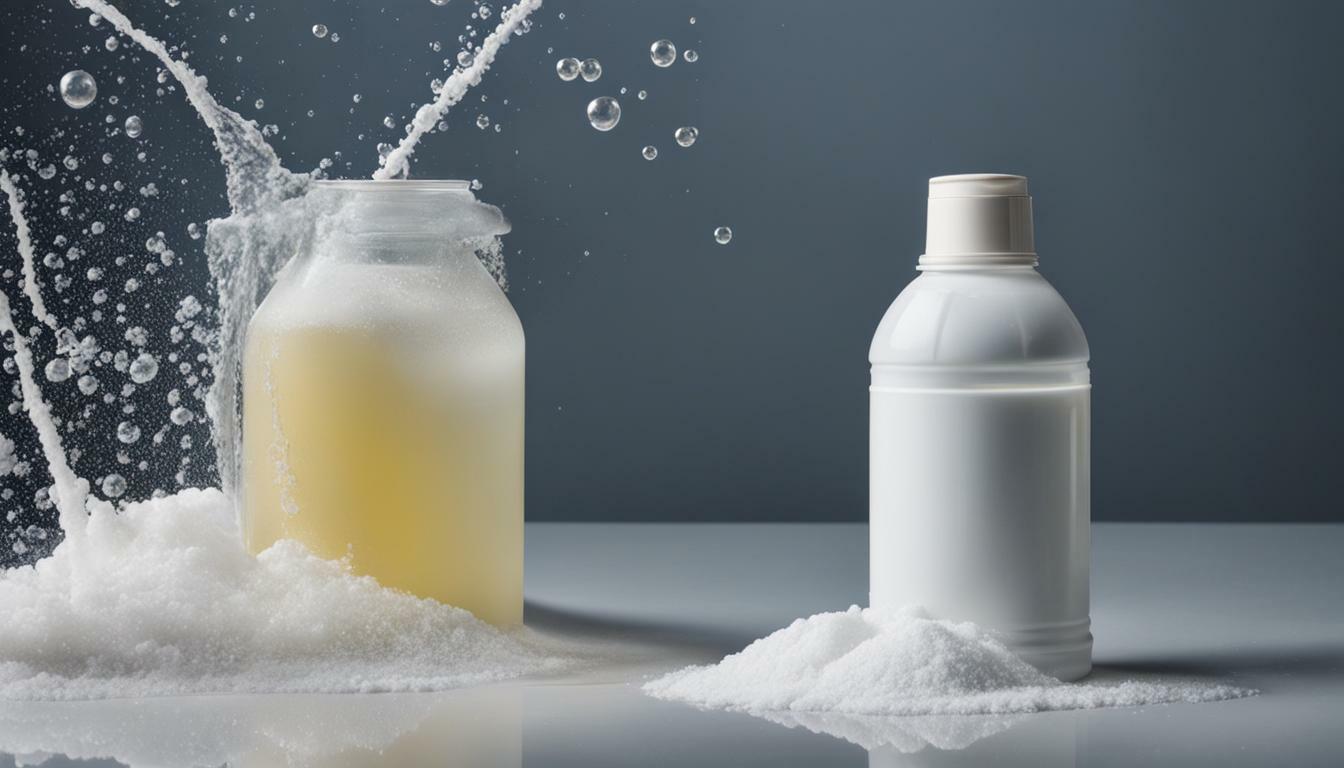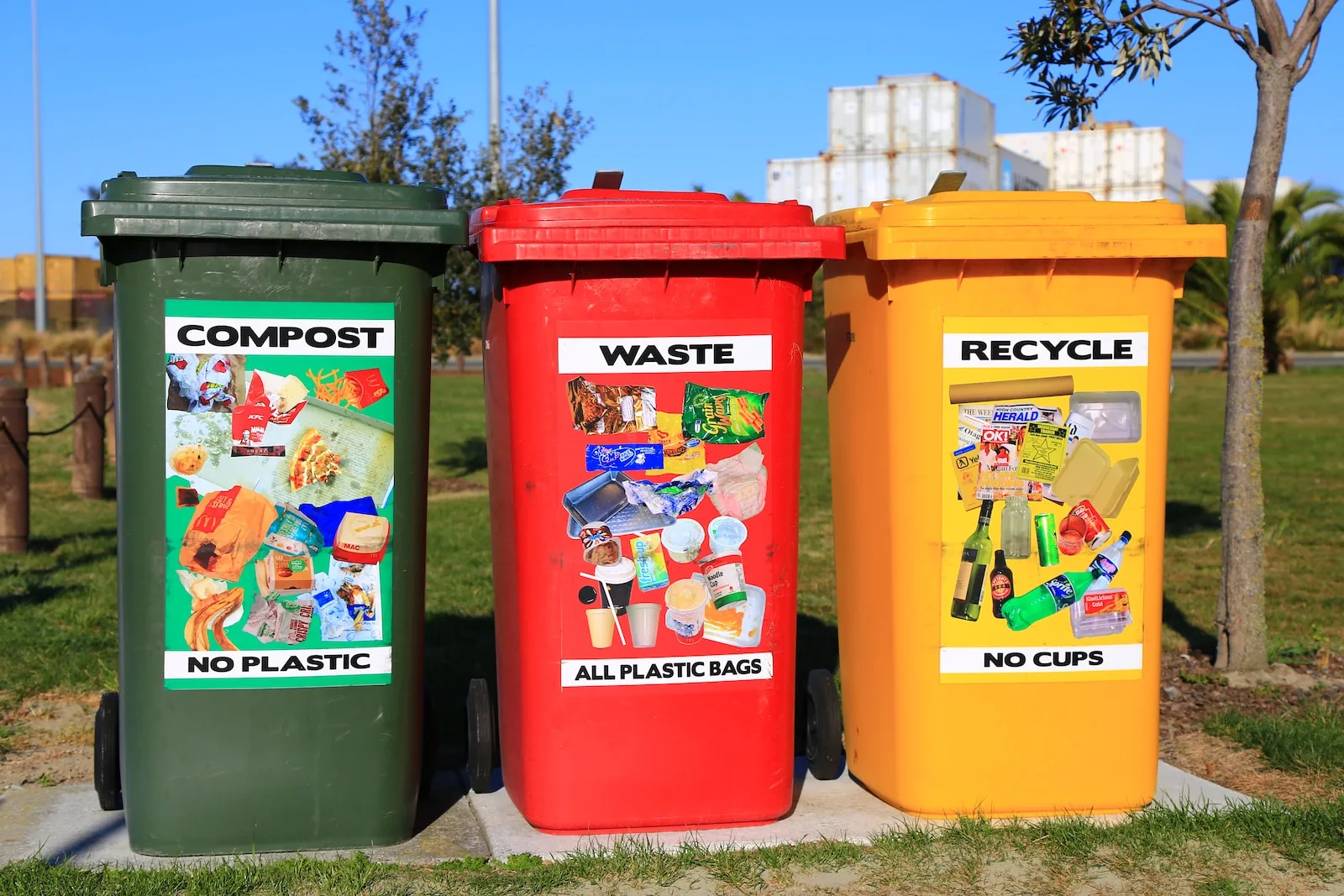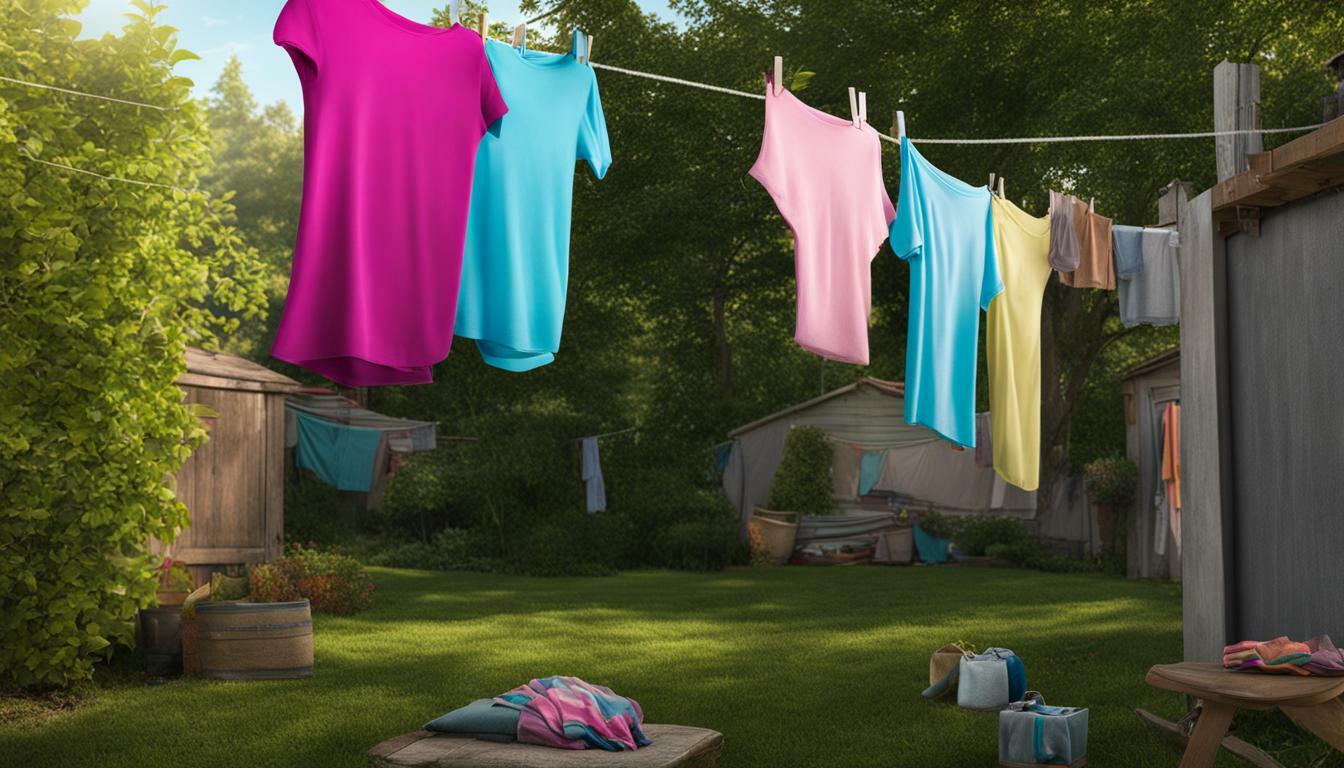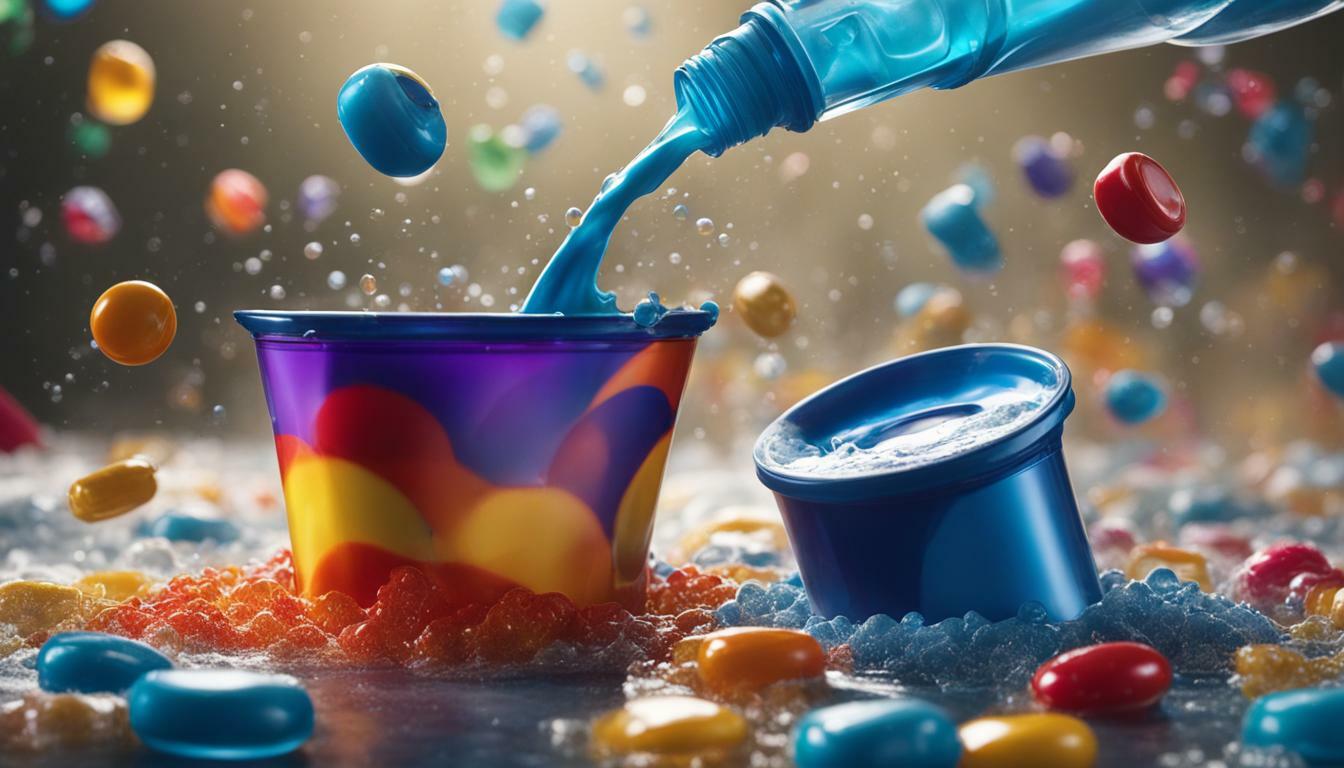When it comes to cleaning, liquid and powdered cleaners are two of the most popular options available. While they both serve the same purpose of cleaning surfaces, they have distinct characteristics that set them apart. In this article, we’ll take a closer look at the features, benefits, uses, effectiveness, and ingredients of both liquid and powdered cleaners, so you can decide which option is best for your cleaning needs.
Key Takeaways:
- Liquid and powdered cleaners are both effective at cleaning surfaces, but they have unique features and benefits.
- Liquid cleaners are versatile, easy to use, and effective at targeting specific areas or surfaces.
- Powdered cleaners have a long shelf life, concentrated formulas, and are cost-effective.
- Factors such as the type of dirt or stain, the nature of the surface, and personal preferences should be considered when choosing the right cleaner for your needs.
Liquid Cleaners: Features and Benefits
When it comes to cleaning, liquid cleaners are a popular option for their many benefits. Here are some of the features that make liquid cleaners a great choice:
- Versatility: Liquid cleaners can be used on a wide range of surfaces, from countertops to floors, making them a great all-purpose cleaner.
- Easy to Use: Liquid cleaners are convenient to use, with no additional mixing or preparation required. Simply spray or pour onto the surface and wipe away.
- Targeted Cleaning: Liquid cleaners can be applied directly to specific areas or stains for targeted cleaning, making them effective for tackling tough dirt and grime.
In addition to their features, liquid cleaners offer several benefits, including:
- Efficiency: Liquid cleaners often work more quickly than powdered cleaners, making them a time-saving option.
- Convenience: With no measuring or mixing required, liquid cleaners are a convenient option for everyday cleaning.
- Sanitation: Some liquid cleaners contain disinfectants or sanitizers, making them effective for keeping surfaces clean and germ-free.
Overall, liquid cleaners are a great choice for those looking for an all-purpose cleaner that is convenient, efficient, and effective.
Liquid Cleaners: Popular Uses
Liquid cleaners are versatile and effective cleaning solutions that can be used in a wide range of cleaning applications. Their ease of use and ability to target specific areas or surfaces efficiently make them a popular choice for everyday cleaning tasks. Here are some of the most common uses of liquid cleaners:
- Kitchen cleaning: Liquid cleaners are perfect for cleaning kitchen surfaces, including countertops, stovetops, and sinks. They can remove tough stains and grease with ease, leaving surfaces clean and shiny.
- Bathroom maintenance: Liquid cleaners are ideal for maintaining a clean and hygienic bathroom. They can remove soap scum, hard water stains, and other grime from surfaces like shower doors, tiles, and toilet bowls.
- Floor care: Liquid cleaners can be used on a variety of floor surfaces, including hardwood, tile, and laminate. They can remove dirt, dust, and stains, and leave floors looking clean and polished.
- General household cleaning: Liquid cleaners can be used throughout the house to clean surfaces like windows, mirrors, and furniture. They are also great for spot cleaning carpets and upholstery.
Whether you are cleaning up after a hectic day at home or tackling stubborn stains in your workplace, a liquid cleaner can help you get the job done quickly and efficiently.
Liquid Cleaners: Effectiveness Compared to Powdered Cleaners
When it comes to choosing between liquid and powdered cleaners, effectiveness is a crucial factor. Liquid cleaners are known for their convenience and ease of use, but how do they compare to powdered cleaners in terms of performance?
One advantage of liquid cleaners is that they typically have a higher concentration of active cleaning agents, making them more effective at tackling stains and grime. They are also better suited for targeting specific areas or surfaces, thanks to their spray, nozzle, or pump application methods.
| Liquid Cleaners: Advantages | Liquid Cleaners: Drawbacks |
|---|---|
|
|
However, liquid cleaners may not be as effective as powdered cleaners when it comes to handling certain types of dirt and stains, especially those caused by hard water. Powdered cleaners are typically formulated with abrasive agents that help to break down dirt and stains, making them effective for tough cleaning tasks. They are also less likely to leave residue, ensuring a thorough clean.
| Powdered Cleaners: Advantages | Powdered Cleaners: Drawbacks |
|---|---|
|
|
Ultimately, the effectiveness of liquid and powdered cleaners depends on various factors, including the type of dirt or stain, the surface to be cleaned, the concentration and quality of active cleaning agents, and the user’s cleaning habits and preferences. It is important to consider these factors when selecting a cleaner to ensure optimal results.
Liquid Cleaners: Ingredients
Liquid cleaners are composed of various ingredients that work together to tackle dirt, stains, and germs. Here are some common components of liquid cleaners:
| Ingredient | Purpose |
|---|---|
| Surfactants | Reduce surface tension and help to lift and remove dirt and stains. |
| Chelating agents | Bind to minerals and other substances in water to prevent them from interfering with the cleaning process. |
| Enzymes | Break down protein, starch, and other organic matter to dissolve tough stains. |
| Solvents | Dissolve grease and oil-based stains. |
| Fragrances | Provide a pleasant scent to the product and the cleaned area. |
It is important to note that some liquid cleaners may contain potentially harmful or toxic ingredients, such as ammonia, bleach, or certain fragrances. Always read the label carefully, and choose products with safe and effective ingredients. If you have concerns about any specific ingredient, consult with a healthcare professional or seek alternative cleaning options.
Powdered Cleaners: Features and Benefits
Powdered cleaners are a popular cleaning option that offer several benefits over liquid cleaners. Here are some of the advantages of using powdered cleaners:
- Concentrated Formulas: Powdered cleaners are typically formulated to be more concentrated than liquid cleaners. As a result, they can be more effective at removing stubborn dirt and stains. Additionally, concentrated formulas mean that less product is required to achieve the desired results, making them more cost-effective in the long run.
- Long Shelf Life: Because powdered cleaners are dry, they have a longer shelf life than liquid cleaners. This means that they can be stored for longer periods of time without spoiling or losing effectiveness.
- Versatile: Powdered cleaners can be used for a variety of cleaning tasks, both indoors and outdoors. They are particularly effective at removing tough stains and grime, making them a popular choice for cleaning surfaces like tile, grout, and concrete.
These benefits make powdered cleaners a popular choice for many households and businesses that require effective and versatile cleaning solutions.
Powdered Cleaners: Popular Uses
Powdered cleaners are an excellent choice for a wide range of cleaning tasks, making them a staple in many households and commercial settings. Their concentrated formulas and abrasive texture make them ideal for tackling tough dirt and stains. Here are some of the most popular uses for powdered cleaners:
| Task | Powdered Cleaner |
|---|---|
| Kitchen Cleaning | Abrasive cleaners such as scouring powders are effective at removing grease, baked-on food, and stains from kitchen surfaces, pots, and pans. |
| Bathroom Maintenance | Powdered cleaners are excellent for cleaning bathroom tiles, toilets, and sinks. They can effectively remove soap scum, hard water stains, and mildew. |
| Floor Care | Powdered cleaners can be used to clean and remove stains from tile, grout, and concrete floors. They are also effective at restoring the shine of hard floors. |
| General Household Cleaning | Powdered cleaners can be used to clean a wide range of surfaces, from countertops to appliances, and even outdoor furniture. They are an effective option for removing dirt, grime, and tough stains. |
Overall, powdered cleaners are versatile, effective, and cost-efficient, making them a popular choice for many cleaning tasks.
Powdered Cleaners: Effectiveness Compared to Liquid Cleaners
When it comes to cleaning, both liquid and powdered cleaners have their strengths and weaknesses. In this section, we will compare the effectiveness of powdered cleaners to liquid cleaners and discuss the factors that may influence their performance.
Ability to Handle Different Types of Dirt and Stains
One of the advantages of powdered cleaners is their ability to handle tough and stubborn dirt and stains. The abrasive nature of some powdered cleaners makes them effective for removing grime, grease, and soap scum from surfaces. They are particularly useful for cleaning bathroom tiles, grout, and sinks.
However, liquid cleaners are better suited for lighter cleaning tasks and for maintaining already clean surfaces. They are gentler on materials and less likely to cause scratches or damage.
Efficacy in Hard Water Conditions
Another advantage of powdered cleaners is their ability to perform well in hard water conditions. Hard water, which contains high levels of minerals like calcium and magnesium, can make it difficult for some cleaning products to work effectively.
Because powdered cleaners are more concentrated than their liquid counterparts, they have a higher tolerance for hard water and can still provide a thorough clean even in such conditions. Liquid cleaners, on the other hand, may be less effective in hard water and may leave behind residue.
Potential for Leaving Residue
One of the limitations of powdered cleaners is their potential for leaving behind residue. This can happen if the cleaner is not thoroughly rinsed off after use. The residue can be unsightly and may even attract more dirt and grime over time.
Liquid cleaners, on the other hand, are less likely to leave residue if used correctly. They can be easily rinsed off with water, leaving surfaces clean and shiny.
Overall, the effectiveness of powdered cleaners versus liquid cleaners depends on the cleaning task at hand and the specific characteristics of the cleaning product. It is important to read labels and choose products that are appropriate for the surface to be cleaned and the type of dirt or stain to be removed.
Powdered Cleaners: Ingredients
Powdered cleaners are composed of a variety of ingredients designed to tackle specific cleaning tasks. While formulations can vary, most powdered cleaners contain a mixture of:
| Ingredient | Purpose |
|---|---|
| Bleach | Removes stains and whitens surfaces |
| Baking Soda | Deodorizes and scrubs surfaces |
| Borax | Cleans and disinfects surfaces |
| Citric Acid | Breaks down scale and mineral deposits |
| Oxalic Acid | Removes rust and stains |
| Surfactants | Breaks down dirt and grease |
Some powdered cleaners may also contain abrasive ingredients such as pumice or silica, which can help with scrubbing tough stains. However, it’s important to note that these abrasives may scratch delicate surfaces like glass or certain types of metal.
When using powdered cleaners, it’s essential to follow the manufacturer’s instructions to ensure safe and effective use. This includes wearing gloves and protective eyewear when necessary, as some powdered cleaners may contain harmful chemicals.
Choose powdered cleaners with ingredients that are safe for your needs and the environment. Look for products that are labeled as environmentally friendly and avoid those that contain phosphates or other harmful chemicals.
Choosing the Right Cleaner for Your Needs
When it comes to cleaning, choosing the right cleaner can make a big difference in achieving the best results. Both liquid and powdered cleaners are popular options, and each has its own distinct features and benefits. So, how do you choose the right cleaner for your specific needs?
First and foremost, consider the surface or material you will be cleaning. Some surfaces may be more sensitive to certain cleaners, while others may require a specific type of cleaner to effectively remove stains or grime. For example, liquid cleaners are great for quick cleanups, while powdered cleaners are better suited for deep-cleaning tasks.
Next, think about the type of dirt or stain you need to remove. Liquid cleaners are particularly effective for removing grease and general household dirt, while powdered cleaners are better at tackling tougher stains like rust or mildew. Additionally, consider any personal considerations such as allergies or environmental concerns.
When in doubt, it’s always a good idea to read product labels and follow manufacturer instructions for usage. This can help ensure that you are using the cleaner correctly and will achieve the best results.
Ultimately, the difference between liquid and powdered cleaners comes down to personal preference and the specifics of your cleaning task. Knowing the features, benefits, uses, effectiveness, and ingredients of each type of cleaner can help you make an informed decision and choose the perfect cleaner for your cleaning needs.
Conclusion
In conclusion, when it comes to cleaning, both liquid and powdered cleaners are popular options with distinct characteristics. Liquid cleaners offer ease of use, versatility, and the ability to target specific areas or surfaces efficiently. Powdered cleaners, on the other hand, boast long shelf life, concentrated formulas, and versatility in different cleaning applications.
When choosing between liquid and powdered cleaners, it is important to consider factors such as the nature of the surface, the type of dirt or stain, and personal considerations like allergies or environmental concerns. By understanding the differences, features, benefits, uses, effectiveness, and ingredients of both types of cleaners, readers can make informed decisions about which cleaner to use for their specific cleaning needs and preferences.
The Difference Between Liquid and Powdered Cleaners
FAQ
Q: Are liquid cleaners more effective than powdered cleaners?
A: The effectiveness of liquid cleaners compared to powdered cleaners can vary depending on the specific cleaning task and the type of dirt or stain. Liquid cleaners are often preferred for their ability to target specific areas or surfaces efficiently and provide a thorough clean. However, powdered cleaners can be highly effective in removing tough stains, tackling grease and grime, and restoring surfaces. It is recommended to consider the specific cleaning needs and the nature of the surface before choosing the most suitable cleaner.
Q: Can liquid cleaners be used on all surfaces?
A: Liquid cleaners are generally safe for use on a wide range of surfaces, including countertops, floors, and bathroom fixtures. However, it is important to read the labels and follow the manufacturer’s instructions to ensure compatibility with specific materials. Some liquid cleaners may not be suitable for delicate surfaces, such as certain types of natural stone or untreated wood, as they may cause damage or discoloration. Always test the cleaner in a small, inconspicuous area before applying it to the entire surface.
Q: Do powdered cleaners leave residue?
A: Powdered cleaners can leave residue if not rinsed properly after use. It is important to thoroughly rinse the surface with clean water to remove any remaining powder particles. The residue can be unsightly and may affect the appearance or feel of the surface. Always follow the manufacturer’s instructions for the correct usage and rinsing procedures to ensure optimal results and minimize residue buildup.
Q: Are liquid cleaners environmentally friendly?
A: The environmental impact of liquid cleaners can vary depending on the specific product and its ingredients. Some liquid cleaners may contain potentially harmful or toxic substances that can be detrimental to the environment if not properly disposed of. However, there are also liquid cleaners available that are formulated with eco-friendly ingredients and are biodegradable. To choose a more environmentally friendly option, look for products that are certified as “green” or “eco-friendly” and have minimal impact on ecosystems.
Q: Are powdered cleaners more cost-effective?
A: Powdered cleaners are often considered more cost-effective compared to liquid cleaners. This is because powdered cleaners typically have a longer shelf life and can be more concentrated, meaning a smaller amount of product is required to achieve effective cleaning results. Additionally, powdered cleaners can be purchased in bulk, further reducing the overall cost per use. However, it is important to consider the specific cleaning needs and preferences to determine the most cost-effective option for individual situations.
 Skip to main content
Skip to main content


